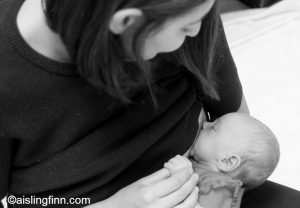Wealthiest countries have lowest breastfeeding rates – including Ireland

Photo: Dublin Mum Irmak breastfeeding baby Aurelia
DUBLIN/NEW YORK , 1 August 2019 – The benefits of breastfeeding for children and mothers are widespread. It supports healthy brain development in babies and young children, it protects infants against infection, decreases the risk of obesity and disease, reduces healthcare costs and protects nursing mothers against ovarian cancer and breast cancer. Yet, policies that support breastfeeding – such as paid parental leave and breastfeeding breaks – are not yet available to most mothers worldwide.
“The health, social and economic benefits of breastfeeding – for mother and child – are well-established and accepted throughout the world. Yet, nearly 60 per cent of the world’s infants are missing out on the recommended six months of exclusive breastfeeding,” said UNICEF Executive Director Henrietta Fore.
Executive Director Fore explains: “In spite of the benefits of breastfeeding, workplaces worldwide are denying mothers much needed support. We need far greater investment in paid parental leave and breastfeeding support across all workplaces to increase breastfeeding rates globally.”
The facts
Only 4 out of 10 babies are exclusively breastfed[1]: Only 41 per cent of babies were exclusively breastfed in the first six months of life in 2018, as recommended. In comparison, these rates were more than half – 50.8 per cent – in the least developed countries.
The highest rates were found in Rwanda (86.9 per cent), Burundi (82.3 per cent), Sri Lanka (82 percent), Solomon Islands (76.2 percent) and Vanuatu (72.6 percent). Research also shows that infants in rural areas have higher levels of exclusive breastfeeding than urban babies.
Upper-middle-income countries have the lowest rates[2]: In upper-middle-income countries, exclusive breastfeeding rates were the lowest at 23.9 per cent, having decreased from 28.7 per cent in 2012.
Breastfeeding at work works: Regular lactation breaks during working hours to accommodate breastfeeding or the expression of breastmilk, and a supportive breastfeeding environment including adequate facilities enable mothers to continue exclusive breastfeeding for six months, followed by age-appropriate complementary breastfeeding.
Working women do not get enough support to continue breastfeeding[3]: Worldwide, only 40 per cent of women with newborns have even the most basic maternity benefits at their workplace. This disparity widens in African countries, where only 15 per cent of women with newborns have any benefits at all to support the continuation of breastfeeding.
Too few countries provide paid parental leave[4]: The International Labour Organization (ILO) Maternity Protection Convention 2000 (no. 183) standards include at least 14 weeks of paid maternity leave, and countries are recommended to provide at least 18 weeks, as well as workplace support for breastfeeding families. Despite this, only 12 per cent of countries worldwide provide adequate paid maternity leave.
UNICEF’s latest policy brief on family-friendly policy brief recommends at least six months of paid leave for all parents combined, of which 18 weeks of paid leave should be reserved for mothers. Governments and businesses should strive for at least 9 months of combined paid leave.
Availability of longer maternity leave means higher chances of breastfeeding[5]: A recent study found that women with six months or more maternity leave were at least 30 per cent more likely to maintain any breastfeeding for at least the first six months.
Makes sense for both babies and their mothers[6]: Increasing breastfeeding could prevent 823,000 annual deaths in children under five and 20,000 annual deaths from breast cancer.
Not enough babies breastfed in the first hour[7]: In 2018, less than half of babies worldwide – 43 per cent – were breastfed within the first hour of life. Immediate skin-to skin contact and starting breastfeeding early keeps a baby warm, builds his or her immune system, promotes bonding, boosts a mother’s milk supply and increases the chances that she will be able to continue exclusive breastfeeding.
Breastmilk is more than just food for babies – it is also a potent medicine for disease prevention that is tailored to the needs of each child. The ‘first milk’ – or colostrum – is rich in antibodies to protect babies from disease and death.
The investment case [8]: If optimal breastfeeding is achieved, there would be an estimated reduction in global healthcare costs of USD 300 billion.
You can read more about Ireland’s rates here, which are sadly amongst the lowest in the world.
ENDS
####
Notes to Editors:
About World Breastfeeding Week
World Breastfeeding Week is marked annually from 1 to 7 August to highlight the critical importance of breastfeeding for children across the globe. Breastfeeding gives children the healthiest start in life and is one of the simplest, smartest and most cost-effective ways we have of ensuring that all children survive and thrive. This fact sheet – marking World Breastfeeding Week – features new data from the 2019 Global Breastfeeding Scorecard, and the latest available evidence on coverage, access to family-friendly policies, and the health and economic benefits of breastfeeding.
Get involved with the conversation on social using the hashtags #WBW2019 #EarlyMomentsMatter
About UNICEF
UNICEF works in some of the world’s toughest places, to reach the world’s most disadvantaged children. Across 190 countries and territories, we work for everychild, everywhere, to build a better world for everyone. For more information about UNICEF and its work for children, visit www.unicef.org
Follow UNICEF on Twitter and Facebook
For more information, please contact:
Aedín Donnelly, UNICEF Ireland, aedin@unicef.ie, 085 1395272
Georgina Thompson, UNICEF New York, + 1 917 238 1559, gthompson@unicef.org
Sabrina Sidhu, UNICEF New York, +1 212 824 6583,ssidhu@unicef.org




